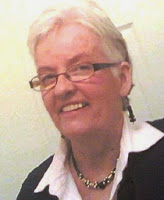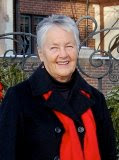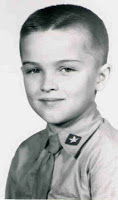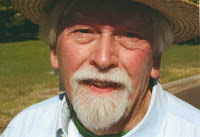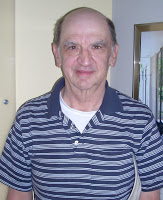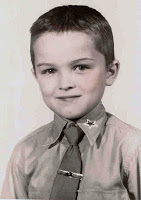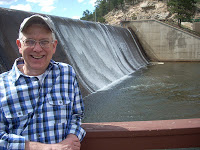I don’t understand terrorism
or terrorists. I mean, intellectually of course I do. I understand what
psychiatrists say about the factors causing people to become terrorists; but I
can’t get inside their heads. I simply cannot feel what it is they are feeling.
With an estimated minimum of a thousand young people a month from different
parts of the globe currently rushing off to join forces with ISIS, however,
it’s clear that creating terror holds an attraction for a significant number of
people.
or terrorists. I mean, intellectually of course I do. I understand what
psychiatrists say about the factors causing people to become terrorists; but I
can’t get inside their heads. I simply cannot feel what it is they are feeling.
With an estimated minimum of a thousand young people a month from different
parts of the globe currently rushing off to join forces with ISIS, however,
it’s clear that creating terror holds an attraction for a significant number of
people.
Not only am I completely
mystified by that desire, or compulsion, to bring terror to others, but I am
fortunate enough to be able to say that I have never felt true terror myself.
That is not because I am remarkably brave and tough. Neither am I in denial of
some unacknowledged terror. It is simply that I have lived my life in a place
and time that has been terror-free. For me, that is. Not, alas, for everyone.
mystified by that desire, or compulsion, to bring terror to others, but I am
fortunate enough to be able to say that I have never felt true terror myself.
That is not because I am remarkably brave and tough. Neither am I in denial of
some unacknowledged terror. It is simply that I have lived my life in a place
and time that has been terror-free. For me, that is. Not, alas, for everyone.
I can only imagine the utter
terror I would feel, hiding in the bushes in Rwanda, waiting to be discovered
and hacked to pieces by my erstwhile friends and neighbors. Or hiding in a room
in Nazi Germany, waiting to be turned in to the Gestapo by my erstwhile friends
and neighbors. Sadly, the list is endless. I would know what real terror was in
Stalin’s U.S.S.R and Mao’s China: the Cambodia of the Khmer Rouge and on and on
to today’s North Korea and most places in the Middle East.
terror I would feel, hiding in the bushes in Rwanda, waiting to be discovered
and hacked to pieces by my erstwhile friends and neighbors. Or hiding in a room
in Nazi Germany, waiting to be turned in to the Gestapo by my erstwhile friends
and neighbors. Sadly, the list is endless. I would know what real terror was in
Stalin’s U.S.S.R and Mao’s China: the Cambodia of the Khmer Rouge and on and on
to today’s North Korea and most places in the Middle East.
I say I can only imagine, but
in truth I’m sure I cannot. I have lived so far from the horror of so many
people’s lives that I cannot begin to imagine what it would be like. I
have lived in my own little warm and cosy cocoon, safe and secure. Oh sure,
I’ve been a bit afraid occasionally. For instance, long before the advent of
cellphones, on business in Florida, I got lost in Miami in the dark and pouring
rain and my rental car broke down in a part of town which looked seriously
uninviting. Walking home in Denver one night after dark someone followed me
step for step. When I slowed, the footsteps behind me slowed; they kept pace if
I walked faster. Nothing bad resulted from these minor incidents, and the most
they made me feel was a bit nervous: just a frisson of fear. I’ve had health
issues that made me feel much the same, but that’s nothing approaching terror.
They call it a cancer scare, after all, not a cancer terror, though I’m
equally sure that being diagnosed with some horrific Stage Four cancer would
certainly invoke terror.
in truth I’m sure I cannot. I have lived so far from the horror of so many
people’s lives that I cannot begin to imagine what it would be like. I
have lived in my own little warm and cosy cocoon, safe and secure. Oh sure,
I’ve been a bit afraid occasionally. For instance, long before the advent of
cellphones, on business in Florida, I got lost in Miami in the dark and pouring
rain and my rental car broke down in a part of town which looked seriously
uninviting. Walking home in Denver one night after dark someone followed me
step for step. When I slowed, the footsteps behind me slowed; they kept pace if
I walked faster. Nothing bad resulted from these minor incidents, and the most
they made me feel was a bit nervous: just a frisson of fear. I’ve had health
issues that made me feel much the same, but that’s nothing approaching terror.
They call it a cancer scare, after all, not a cancer terror, though I’m
equally sure that being diagnosed with some horrific Stage Four cancer would
certainly invoke terror.
The most frightened I have
ever been, I think, were two instances involving airplanes.
ever been, I think, were two instances involving airplanes.
One was on a flight from New
York’s La Guardia to London Heathrow. It was at the height of the Falklands
“war,” so it must have been 1982. I was working God knows how many
hours a week at the time and as soon as I settled to watch the movie, which was
Tora Tora Tora, I fell into a deep sleep. Over the mid-Atlantic we hit
some really rough air, and even that didn’t wake me, but a combination of
things suddenly did. We were bouncing around so badly that one of the overhead
bins bust open – it must not have been securely latched – and a hard-sided case
fell out onto the woman directly in front of me. It must have been heavy as
blood started pouring from her head and she began to scream. At precisely the
same moment, a voice from the cockpit announced with regret that the H.M.S.
Sheffield had been sunk with heavy loss of life. Well, you know what it’s like
when you are rudely awakened from a very deep sleep. You lust can’t get your
bearings. I was awash in confusion. My last memories, from the movie, were of
air battles; planes crashing into the ocean. The name Sheffield bothered me
because that’s where I went to College. Were we at war? What was happening? Why
was that woman screaming and bleeding?
York’s La Guardia to London Heathrow. It was at the height of the Falklands
“war,” so it must have been 1982. I was working God knows how many
hours a week at the time and as soon as I settled to watch the movie, which was
Tora Tora Tora, I fell into a deep sleep. Over the mid-Atlantic we hit
some really rough air, and even that didn’t wake me, but a combination of
things suddenly did. We were bouncing around so badly that one of the overhead
bins bust open – it must not have been securely latched – and a hard-sided case
fell out onto the woman directly in front of me. It must have been heavy as
blood started pouring from her head and she began to scream. At precisely the
same moment, a voice from the cockpit announced with regret that the H.M.S.
Sheffield had been sunk with heavy loss of life. Well, you know what it’s like
when you are rudely awakened from a very deep sleep. You lust can’t get your
bearings. I was awash in confusion. My last memories, from the movie, were of
air battles; planes crashing into the ocean. The name Sheffield bothered me
because that’s where I went to College. Were we at war? What was happening? Why
was that woman screaming and bleeding?
Why was the plane pitching and
reeling? Were we going down in the ocean? I’m sure this complete lack of any
grasp on reality was very short-lived, but it seemed like forever and I was
truly scared. But I think I was too confused to be really terrified, and I
realized well enough that I was confused. Had we really been going down, yes,
then I’m sure I would have felt undeniable terror, for real. I think, now, of
those doomed passengers on that flight that went down in Pennsylvania on 9/11,
and more recently the one that wandered off course around the skies for several
hours before, they think, ending up at the bottom of the Indian Ocean; some
terror involved there, I would guess.
reeling? Were we going down in the ocean? I’m sure this complete lack of any
grasp on reality was very short-lived, but it seemed like forever and I was
truly scared. But I think I was too confused to be really terrified, and I
realized well enough that I was confused. Had we really been going down, yes,
then I’m sure I would have felt undeniable terror, for real. I think, now, of
those doomed passengers on that flight that went down in Pennsylvania on 9/11,
and more recently the one that wandered off course around the skies for several
hours before, they think, ending up at the bottom of the Indian Ocean; some
terror involved there, I would guess.
The other time was when my
husband of the time was flying us back from California in our little
four-seater plane. There were the two of us and my two youngest step-children.
We had just cleared the Sierra Nevada summit, heading East back to Colorado at
about 8,000 feet in a clear blue sky. Suddenly an invisible hole in the sky
opened up and we fell through it like a rock. My stomach hit the roof. The
clipboard securing the navigation charts, which I always held on my lap, shot
up and the metal clip gouged a big gash under my chin. My step-daughter started
screaming. The hillside was coming up to meet us at a really frightening speed.
The plane stopped falling as suddenly as it had started, and we landed at the
first available spot to make sure there was no damage. There was a crack in one
wing and in the tail, but not enough to stop us flying on home. We later
calculated that we had dropped about 6,000 feet in very few seconds.
husband of the time was flying us back from California in our little
four-seater plane. There were the two of us and my two youngest step-children.
We had just cleared the Sierra Nevada summit, heading East back to Colorado at
about 8,000 feet in a clear blue sky. Suddenly an invisible hole in the sky
opened up and we fell through it like a rock. My stomach hit the roof. The
clipboard securing the navigation charts, which I always held on my lap, shot
up and the metal clip gouged a big gash under my chin. My step-daughter started
screaming. The hillside was coming up to meet us at a really frightening speed.
The plane stopped falling as suddenly as it had started, and we landed at the
first available spot to make sure there was no damage. There was a crack in one
wing and in the tail, but not enough to stop us flying on home. We later
calculated that we had dropped about 6,000 feet in very few seconds.
And it was scary, but it was
all over before I had time to work up to real terror. Maybe it’s just that my
reactions are too slow!
all over before I had time to work up to real terror. Maybe it’s just that my
reactions are too slow!
I had planned to end there,
but you know how these stories go. Sometimes they seem to take on a life of their
own and go off on a tangent you had not planned to take. So we’ll just follow.
but you know how these stories go. Sometimes they seem to take on a life of their
own and go off on a tangent you had not planned to take. So we’ll just follow.
Some of you may remember that
several months ago I wrote about my dad, who, lost in a daze of dementia,
created havoc by trying to liven up their electric heater, which was made to
look somewhat like a real fire, by jabbing at it with the old metal poker.
several months ago I wrote about my dad, who, lost in a daze of dementia,
created havoc by trying to liven up their electric heater, which was made to
look somewhat like a real fire, by jabbing at it with the old metal poker.
I was writing this current
story, last week, on a very cold day, around zero outside. Somehow when it’s
that cold, it seems to seep into the house regardless of how you have set the
thermostat.
story, last week, on a very cold day, around zero outside. Somehow when it’s
that cold, it seems to seep into the house regardless of how you have set the
thermostat.
I was cold. I huddled closer
to the cozily-glowing gas insert fireplace and noticed that there was a
considerable gap between two of the “logs.” No wonder it’s cold in
here, I thought, and unbidden the next thoughts leapt into my head. I
need to get the poker and rearrange those logs a bit, that’ll warm things up.
to the cozily-glowing gas insert fireplace and noticed that there was a
considerable gap between two of the “logs.” No wonder it’s cold in
here, I thought, and unbidden the next thoughts leapt into my head. I
need to get the poker and rearrange those logs a bit, that’ll warm things up.
Now that truly terrifies me.
© 24 Nov 2014
About the Author
I
was born and raised in England. After graduation from college there, I moved to
the U.S. and, having discovered Colorado, never left. I have lived in the
Denver-Boulder area since 1965, working for 30 years at IBM. I married, raised
four stepchildren, then got divorced after finally, in my forties, accepting
myself as a lesbian. I have now been with my wonderful partner Betsy for 25
years.
was born and raised in England. After graduation from college there, I moved to
the U.S. and, having discovered Colorado, never left. I have lived in the
Denver-Boulder area since 1965, working for 30 years at IBM. I married, raised
four stepchildren, then got divorced after finally, in my forties, accepting
myself as a lesbian. I have now been with my wonderful partner Betsy for 25
years.

